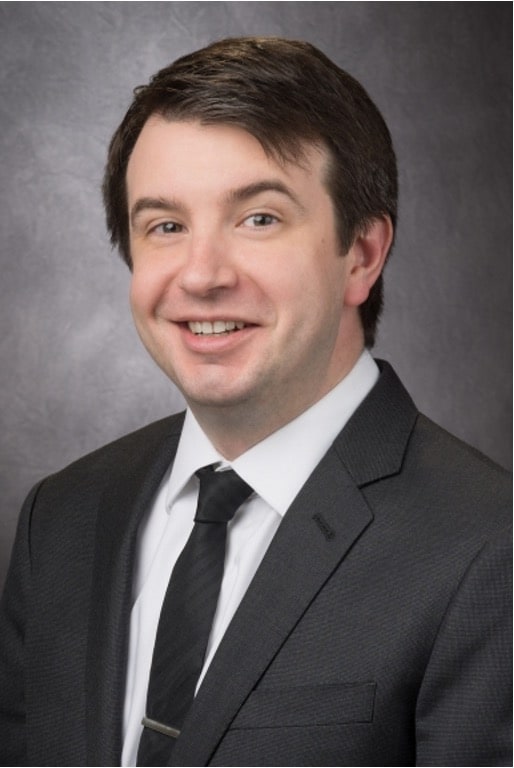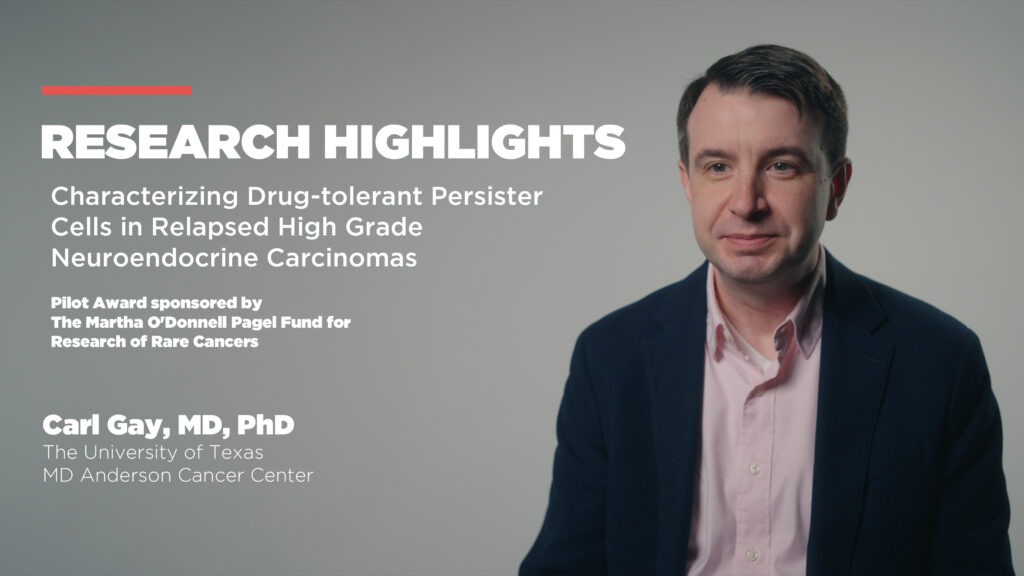Project title: Characterizing drug-tolerant persister cells in relapsed high grade neuroendocrine carcinomas
Carl M. Gay, MD, PhD The University of Texas MD Anderson Cancer Center

- Status: Completed
- Year(s): 2022
- Grant Type: Pilot
- Research Type: Translational
- Primary Tumor Site: Multiple
- Area of Inquiry: Treatment resistance in high-grade NECs
- Article/Video: Click Here
Description
In his previous NETRF-supported research, Dr. Gay and his colleagues generated novel resources, including mouse and cell line models, derived from patients who have rare neuroendocrine carcinomas. In the newly funded work, the investigators plan to use these models to address a major unmet need in neuroendocrine carcinomas – namely how these tumors manage to persist and become treatment-resistant.
What critical NET problem/question will researchers try to answer?
Nearly all patients who have neuroendocrine carcinomas, regardless of the magnitude of their initial responses to therapy, will eventually relapse. This occurs even in cases where imaging tests suggest that the patients’ disease appears to have responded completely. Dr. Gay and his colleagues hypothesize that persister cells – cells that can survive and eventually proliferate despite effective chemotherapies – underlie this phenomenon and that they can identify and target these persister cells using the new models they developed.
Why is this important?
Patients who experience terrific initial responses but inevitably relapse experience only modest improvements in their quality or quantity of life. Dr. Gay and his colleagues believe that if persister cells can be identified then they can be killed, and if they can be killed these terrific but transient treatment responses may lead to more durable remissions.
What will the researchers do?
Using models of neuroendocrine carcinomas, Dr. Gay and his colleagues will trace the origin of and characterize the features of persister cells when these cancers are exposed to standard therapies for neuroendocrine carcinomas.
How might this improve treatment of NETs?
Dr. Gay and his team hope that their approach will lead to the identification of features of persister cells such that they can be prevented or reversed.
What is the next step?
The next step is testing whether these persister cells can be prevented or killed with available drugs or developing new drugs to target them.
Outcomes:
Click below to watch an update from Dr. Gay.

Extrapulmonary small cell carcinomas and, in fact, most high-grade neuroendocrine carcinomas, initially experience remarkable responses to chemotherapy or radiation. Unfortunately, these tumors almost invariably relapse. While responses may recur, meaningful remissions or cures are rarely achieved despite scans with little or no detectable disease. We hypothesized that drug-tolerant persister cells are responsible for these inevitable recurrences. In other words, a small population of cells that are either inherently resistant to therapies or adapt to develop said resistance in response to treatment survive and eventually thrive despite our best efforts.
We reasoned that since these cells are rare, our typical approaches to characterizing therapeutic targets in high-grade neuroendocrine carcinomas could easily fail to detect them. Hence, when analyzing the “bulk” of the tumor from biopsies or surgical specimens, we analyze the common, not the rare. In order to identify vulnerabilities of these drug tolerant persister cells, we needed a way to detect them and, most importantly, separate them. To do this, we adapted an experimental approach termed “Watermelon”. Briefly, this technique allows us to modify high-grade neuroendocrine carcinoma cells to glow brightly red. These glowing red cells were then exposed to effective chemotherapies at high doses – drugs like cisplatin and etoposide commonly used for high-grade neuroendocrine carcinomas. Many of the cells quickly die, as expected, but a few cells do survive and we can collect those. We then separate the surviving cells on the basis of the brightness of their red glow. Cells that have continued to rapidly divide will have gradually lost their glow as the fluorescent molecules are shared with more and more of their offspring. These actively dividing cells likely survived the chemotherapy just by luck – safety in numbers – but would likely have been eradicated by future rounds of chemotherapy or radiation if the experiment were extended. On the other hand, the cells most resistant to chemotherapy are those cells that shift to a dormant state and, therefore, never lose their ‘glow’.
Separating the brightly red cells, we confirmed that these cells exhibit the features we hypothesized for drug tolerant persister cells. They exhibit little to no cell division when under stress and are remarkably resistant to all but the highest doses of otherwise effective chemotherapies. We have spent the past months characterizing these cells – hallmarks for detection, strengths, and vulnerabilities. These profiles allowed us to confirm that this phenomenon occurs not only in dishes with cultured neuroendocrine carcinoma cells, but also in mice with tumors implanted from neuroendocrine carcinoma patients experiencing resistance. Importantly, we identified that these persister cells express unique proteins at their cell surface. We propose that these proteins could be used not only to detect persister cells in patients but exploited to destroy them. The proteins could be used as a beacon for the delivery of high-dose chemotherapies directly to the persister cell or even for the delivery of immune cells.
Finally, we have submitted our extensive collection of patient biopsies and blood samples collected under this grant for full profiling to ensure that the persister cells identified in the lab are recurrent and identifiable in human samples as hypothesized. In the coming years, we propose to generate antibodies to a selection of these persister cell-specific proteins that can be utilized to test approaches to eradicate these cells that drive these recurrences (and the poor prognoses) for neuroendocrine carcinoma patients.
Additional Details
- City: Houston
- State: TX
- Country: United States
- Grant Duration: 1 year
- Sponsor: Martha O’Donnell Pagel Research Award
DISCLAIMER
NETRF funds laboratory research to understand the development of neuroendocrine tumors and translational research to explore new concepts in treatment. Research grant descriptions and research updates from NETRF are not intended to serve as medical advice. It can take years for research discoveries to be fully validated and approved for patient care. Always consult your health care providers about your treatment options.
